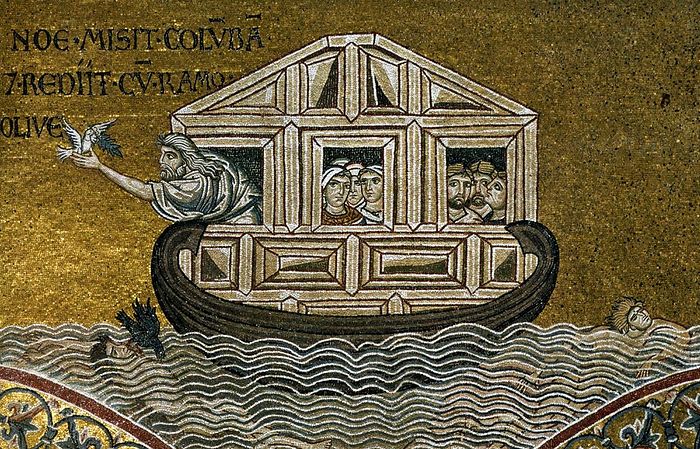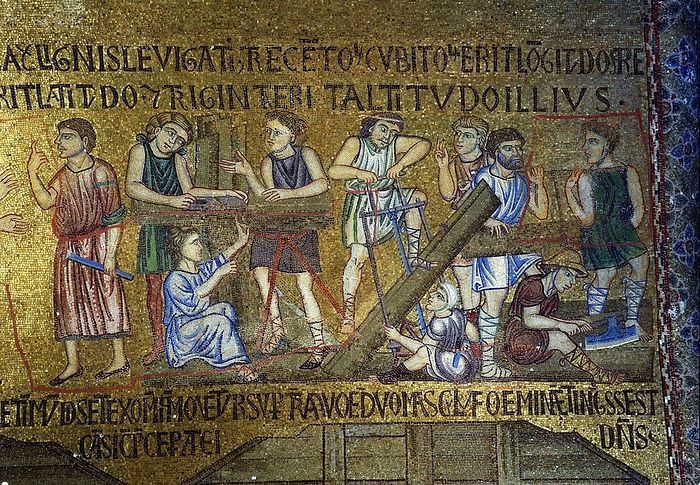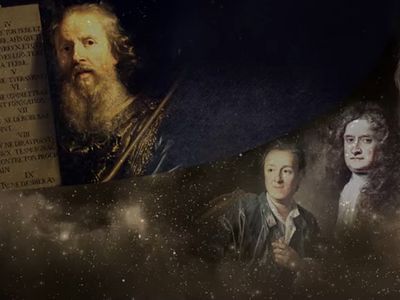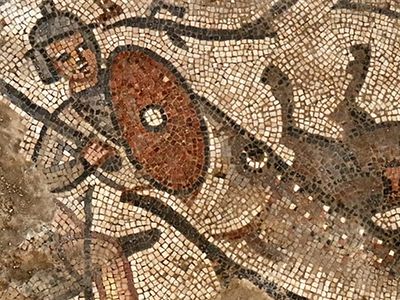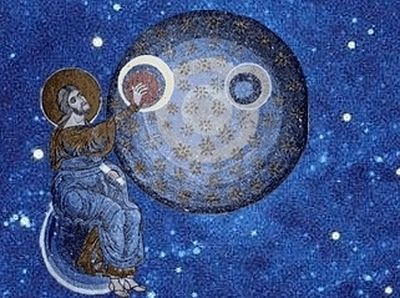Part 5. Is Any Service Pleasing to God?
In another conversation on the book of Genesis, Andrei Ivanovich Solodkov speaks about why it repented the Lord that He had made man on the earth (Gen. 6:6), what was foreshadowed by the ark made by Noah, how the holy fathers interpret its arrangement, what was Noah’s first act after the flood and what it teaches us.
For an Orthodox Christian, the subject of the destruction of the antediluvian civilization sounds like a warning about the cause of the ruin and apostasy of the modern world. In the Gospel of Mark the Savior warned about the end of this world and instructed the disciples: Verily I say unto you, This generation shall not pass, till all these things be fulfilled. Heaven and earth shall pass away, but my words shall not pass away. But of that day and hour knoweth no man, no, not the angels of heaven, but my Father only. But as the days of Noah were, so shall also the coming of the Son of man be. For as in the days that were before the flood they were eating and drinking, marrying and giving in marriage, until the day that Noah entered into the ark, And knew not until the flood came, and took them all away; so shall also the coming of the Son of man be. Then shall two be in the field; the one shall be taken, and the other left. Two women shall be grinding at the mill; the one shall be taken, and the other left. Watch therefore: for ye know not what hour your Lord doth come. But know this, that if the goodman of the house had known in what watch the thief would come, he would have watched, and would not have suffered his house to be broken up. Therefore be ye also ready: for in such an hour as ye think not the Son of man cometh (Mt. 24:34-44).
Giants, set at naught by God
Let’s turn to the book of Genesis. In chapter 6 we read:
And it came to pass, when men began to multiply on the face of the earth, and daughters were born unto them, That the sons of God saw the daughters of men that they were fair; and they took them wives of all which they chose. And the Lord said, My spirit shall not always strive with man, for that he also is flesh: yet his days shall be an hundred and twenty years (Gen. 6:1-3).
Who are these sons of God and daughters of men, why were their marriages not pleasing to God, and what’s more—why were such unions set at naught by the Spirit of God?[1]
St. Ephraim the Syrian writes:
He called the sons of Seth sons of God, those who, like the sons of Seth, had been called “the righteous people of God.” The beautiful daughters of men whom they saw were the daughters of Cain who adorned themselves and became a snare to the eyes of the sons of Seth. Then Moses said, they took them wives of all which they chose. A poor one would exalt himself over the wife of a rich man and an old man would sin with one who was young. The ugliest of all would act arrogantly over the most beautiful.
In the verses I presented it speaks about the reasons for cutting down human life on earth: And the Lord said, My spirit shall not always strive with man, for that he also is flesh: yet his days shall be an hundred and twenty years. As we see, the reason for this is the disdain of the Spirit of God.
We read further:
There were giants in the earth in those days; and also after that, when the sons of God came in unto the daughters of men, and they bare children to them, the same became mighty men which were of old, men of renown (Gen. 6:4).
Interesting words: from these mixed marriages giants are born! Why is it said: mighty men which were of old, men of renown? They were certainly strong, and for them the external was more important than the internal: external arrogance and narcissism was inherent to them. St. Basil the Great writes thus: “Strength of arm, speed of foot, and comeliness of body make a man bold, although it is all destroyed by disease and drained by time. And he does not comprehend that All flesh is grass, and all the goodliness thereof is as the flower of the field (Is. 40:6). Such were the giants… Thus, power breeds arrogance.”
No need to marvel, that as it was then, so it is now. In our time there’s a real cult of sports. I’m not against sports—God forbid, if they’re a good thing. But when sports become the meaning of our life, when a man achieves his desired results at any cost, when the ends justify the means, then it always ends mournfully for that person. Therefore a very important task stands before the missionary who speaks with people in sports sections—to be able to bring the word of God in a language they understand, setting clear priorities: God and service to Him in the first place, and then all the rest, and, of course, to try not to get carried away by a spirit of competitiveness and rivalry.
And so, we see how these people were—mighty men which were of old, men of renown: they gloried and boasted precisely in their flesh, their external beauty and strength, and therein they were set at naught by the Spirit of God.
“I will destroy man”
And we read further:
And God saw that the wickedness of man was great in the earth (this is confirmed by the words of Holy Scripture, because wickedness really was multiplied on earth—A.S.), and that every imagination of the thoughts of his heart was only evil continually (Gen. 6:5).
Imagine, what kind of condition mankind had reached in the antediluvian world, if their every thought was evil, and goodness was almost completely gone.
…And it repented the Lord that he had made man on the earth, and it grieved him at his heart (Gen. 6:6).
The word “repented” is used in relation to God as an anthropomorphism. Such anthropomorphisms attached to God are found quite often in the Bible, for example, it says that God has hands, feet, a mouth… These things are attributed to God in Holy Scripture for our human understanding.
And the Lord said, I will destroy man whom I have created from the face of the earth; both man, and beast, and the creeping thing, and the fowls of the air; for it repenteth me that I have made them (Gen. 6:7).
Why even the cattle and creeping things and birds? Because man is the crown of creation. Man was placed by God to be responsible for the world, which God had created for him. But due to the Fall, by man’s departure from God, in man has developed and is developing a predatory and consumer attitude towards nature, on the principle of “live as if there’s no tomorrow.”[2] It’s no wonder this expression has been preserved, for it reflects the whole character and whole degradation of the antediluvian world. Therefore God says I will destroy man.
Because of the disregard of the Holy Spirit degeneration began, as they say today: “the degeneration of the nation,” “the degeneration of the people.” What do these words mean? The disdain of the Spirit of God is the blasphemy against the Holy Spirit, that is, conscious resistance to the will of God, the law of God, neglecting the grace and all the means given us by God for completing the work of our salvation from the death of sin. But this resistance is not necessarily open theomachy. Resistance to God is expressed in the spirit of antichrist, when a lie is given for the truth of the Gospel message, when Truth is bent under the standards of this age in favor of human desires and ideas. Recall the words of C. S. Lewis: “Divine Revelation is not a coat rack upon which to hang human ideas.”
People have become corrupted. So it is written: And God saw that the wickedness of man was great in the earth, and that every imagination of the thoughts of his heart was only evil continually.
We read further:
But Noah found grace in the eyes of the Lord. These are the generations of Noah: Noah was a just man and perfect in his generations, and Noah walked with God (Gen. 6:8-9).
“Just” does not mean “holy, sinless.” Only God is sinless. Here it is said of Noah that he was just, but not sinless—that he was just in his generations—that is, Noah was a just man in the depraved antediluvian society, at that historical moment.
Noah walked with God (Gen. 6:9).
But let’s read further:
And Noah begat three sons, Shem, Ham, and Japheth. The earth also was corrupt before God, and the earth was filled with violence. And God looked upon the earth, and, behold, it was corrupt; for all flesh had corrupted his way upon the earth (Gen. 6:10-12).
People began to live disregarded by the Spirit of God, to live according to their own volition. They began to take freedom as permissiveness. As Russian philosopher N. Berdyaev wrote: “People began to understand freedom not ‘for,’ but ‘from.’” Not for service to God and man, but from service to God and man. When today’s youth say: “Oi, I’m so tired of this week! Come on, let’s cut loose this weekend,” I always ask: “From Who are you cutting loose? From God, Who is Love and Life?” And really, in those places where they go to “cut loose,” perhaps from God, and or to break free from life’s full program, they do so such that after such this detachment, they don’t come to themselves or return to life.
The ark
And we read further in the book of Genesis:
And God said unto Noah, The end of all flesh is come before me; for the earth is filled with violence through them; and, behold, I will destroy them with the earth. Make thee an ark of gopher wood; rooms shalt thou make in the ark, and shalt pitch it within and without with pitch. And this is the fashion which thou shalt make it of: The length of the ark shall be three hundred cubits, the breadth of it fifty cubits, and the height of it thirty cubits. A window shalt thou make to the ark, and in a cubit shalt thou finish it above; and the door of the ark shalt thou set in the side thereof; with lower, second, and third stories shalt thou make it (Gen. 6:13-16).
As we see, there were three divisions in the ark; it was pitched inside and out and had two openings: one was on top, and the other on the side.
The ark is a type of the Church. The fathers of the Alexandrian School saw meaning and prefigurations in the very smallest of details of the ark’s arrangement. For example, the inside resin is a resin preserved for the judgment of God over those who go to Church but don’t seek God—just to go, but without repentance, to seek something of themselves, at their own pleasure—because it says in Holy Scripture that the judgment of God begins with the house of the Lord. And the outer resin is for the outsiders—those who heard the call but never came to the Church. That is, it’s an indication to us that not all who come to church and even to the Mysteries are embarking upon salvation. What is necessary for salvation? How to approach the Mysteries? Having a heart that is broken and humbled (Ps. 50:19). In and of itself going to church is not a guarantee of salvation. But we mustn’t forget that without the Church there is no salvation.
About the openings made on the top and side of the ark, Blessed Augustine writes that the opening above is the prayer of the Church to God, and the opening on the side is the prayer of the Church for the people. In this is a commandment of love—for God and neighbor.
God says to Noah:
But with thee will I establish my covenant; and thou shalt come into the ark, thou, and thy sons, and thy wife, and thy sons' wives with thee. And of every living thing of all flesh, two of every sort shalt thou bring into the ark, to keep them alive with thee; they shall be male and female (Gen. 6:18-19).
Both clean and unclean animals were gathered in the ark to save the animal kingdom. Unclean animals are those which were not suitable for food. Although the command on partaking of meat will be necessary only after the Flood, the mighty men and apostates from God willfully violated the commandment, killing animals and eating meat.
But the question here is: if the ark is a type of the Church, then why were there both the clean and unclean animals in it? Because there are different people in the Church. Note that sin in the Church is not the sin of the Church, but a sin against the Church.
And we read further in Genesis:
Thus did Noah; according to all that God commanded him, so did he (Gen. 6:22).
This is a very important note! Noah, as just in his generation, does all that the Lord pointed out to him.
Chapter seven begins with the words:
And the Lord said unto Noah, Come thou and all thy house into the ark; for thee have I seen righteous before me in this generation (Gen. 7:1).
Pay attention: again is repeated the words in this generation—it’s always emphasized.
Of every clean beast thou shalt take to thee by sevens, the male and his female: and of beasts that are not clean by two, the male and his female. Of fowls also of the air by sevens, the male and the female; to keep seed alive upon the face of all the earth. For yet seven days, and I will cause it to rain upon the earth forty days and forty nights; and every living substance that I have made will I destroy from off the face of the earth. And Noah did according unto all that the Lord commanded him (Gen. 7:2-5).
And again is repeated the word we already read: Noah did according unto all that the Lord commanded him. Do you see why Noah was saved? And who is saved in the Church? Those who do that which the Lord commands them.
For 120 years Noah was building this ark; for 120 years the message of salvation and warning of destruction rang out. But the people said: “Noah, have you lost your mind? Where are you planning to float to? There’s no rain! (The land was then watered with abundant dew.) The sea is far, and you’re building such a large ship… How do you plan to get to the sea with it?” And Noah answered: “There will be rain—and not just rain, but a flood!” And he heard: “What flood?! What are you saying? Water from heaven—it’s unbelievable. Everything is fine; there will be no flood; everything’s alright! You, Noah, are just a fanatic.”
Today they also make fun of Christians. The Orthodox say: “The Lord will come for us to take us to Heaven.” The unbelievers object: “Do you have wings, or are you going to grow some? How are you going to rise up? And the Law of Gravity? And if you rise up, you’ll be burnt in the atmospheric layers…” The world has its own vision, and the world measures by its own measure. But for God, having created all physical, chemical, biological, and thermodynamic laws, there are no obstacles to abolishing them at His discretion. He is omnipotent; that is, He can do anything. Therefore Christ says: You are not of this world. I repeat: the world measures by its own yardstick, with its own vision of God and man. We spoke about these views in our earlier conversations, when we parsed out the first chapters of the book of Genesis. God is not an old man, sitting on a cloud. Such a vision of God is primitive, and, of course, such a God can do nothing, and it’s barely worth it to believe in such a god.
So, the ark, according to the interpretation of the holy fathers is a prefigurement of the Church. Note that God does not propose that if someone does not agree with Noah he should build an alternative ark. In our talk “Is Any Service Pleasing to God?” we said that only that service which aligns with His will is pleasing to God and useful. So it is here. God’s will is such that all who want to be saved must enter into the ark. So it is today: all desiring to acquire salvation must first enter into the Church by the Mystery of Baptism and begin the work of their salvation. As then there was no alternative salvation outside the ark, so today there is no salvation outside the Church—outside of Christ, because the Church is the Body of Christ, and we are the living cells of this Living Organism, and Christ Himself is the head. And when the Orthodox Church appeals to people of other religions with the words of the unadulterated Gospel, we do it not because we fight against them, but we fight precisely for them, for their immortal souls, the salvation of which is possible only in Jesus Christ. St. Theophan the Recluse writes about it this way in his book The Way of Salvation: “Protestants wanted to correct Catholicism, but made it worse. They desire to be saved outside the ark of the Church on their own rafts…” And he notes that all who did not come into the ark, died. It is not enough to call oneself a Christian, but it’s necessary to become one, and to become one is possible in the fullest sense of the word only in the Church, where through the Mysteries occurs union with the Lord, according to His goodness towards man.
The Flood
And we read further:
And it came to pass after seven days, that the waters of the flood were upon the earth. In the six hundredth year of Noah's life, in the second month, the seventeenth day of the month, the same day were all the fountains of the great deep broken up, and the windows of heaven were opened. And the rain was upon the earth forty days and forty nights. In the selfsame day entered Noah, and Shem, and Ham, and Japheth, the sons of Noah, and Noah's wife, and the three wives of his sons with them, into the ark (Gen. 7:10-13).
It further describes how Noah called the animals into the ark. It’s interesting that even the animals heard Noah’s call. Even animals went to the ark, to be saved, but people neglected salvation!
The Lord said: And, behold, I, even I, do bring a flood of waters upon the earth, to destroy all flesh, wherein is the breath of life, from under heaven; and every thing that is in the earth shall die (Gen. 6:17). Some say today that only a particular part of Earth was filled with the waters of the Flood—only Palestine. A strange proposition. Thrice it’s repeated that all living things upon earth were killed. We read:
And all flesh died that moved upon the earth, both of fowl, and of cattle, and of beast, and of every creeping thing that creepeth upon the earth, and every man: All in whose nostrils was the breath of life, of all that was in the dry land, died. And every living substance was destroyed which was upon the face of the ground, both man, and cattle, and the creeping things, and the fowl of the heaven; and they were destroyed from the earth: and Noah only remained alive, and they that were with him in the ark (Gen. 7:21-23).
What else is needed to prove to people who think that only some part of the earth was submerged? They say that perceptions of geography in that time, when the book of Genesis was created, were limited. But Moses, its author, wrote being moved by the Holy Spirit! He was not an eyewitness of all these events, but the Holy Spirit revealed to him how everything was. By the way, scientists who believe that the world and all the laws in the world and the whole universe were created by God express themselves on this matter thus: after the Flood the climate on earth changed; before the Flood Earth’s axis was not tilted at 12°, but during the Flood God moved the Earth’s axis to 12°, thereby forming the poles—Northern and Southern, the climate changed, the greenhouse period ended, when the earth was watered by an abundance of dew, and after the Flood atmospheric precipitation began to fall to the earth. Today remains of mammoths are found at the North Pole. A baby mammoth was even found with a flower in his jaws, which he was chewing: so he died with this flower. An instantaneous catastrophe occurred on earth, and the whole earth forfeited its life!
Salvation
Let’s read further:
And God remembered Noah, and every living thing, and all the cattle that was with him in the ark (Gen. 8:1).
Then events develop as follows:
And it came to pass at the end of forty days, that Noah opened the window of the ark which he had made: And he sent forth a raven, which went forth to and fro, until the waters were dried up from off the earth (Gen. 8:6-7).
What an interesting verse! Blessed Augustine, giving an interpretation on it, addresses himself to a Christian who is in the Church but fickle in his service, delaying work upon his salvation: “It is unknown when the last hour is coming, and you say: ‘I will amend myself.’ ‘When will you amend yourself; when will you change?’ ‘Tomorrow,’ you answer. And every time you say: ‘tomorrow, tomorrow.’ You have turned into a raven. And I say to you: ‘While you croak like a raven, death awaits you.’ After all, the raven, whose voice you imitate, flew out of the ark, and did not return. You, brother, return to the Church, which this ark signified.”
Also he sent forth a dove from him, to see if the waters were abated from off the face of the ground; But the dove found no rest for the sole of her foot, and she returned unto him into the ark, for the waters were on the face of the whole earth: then he put forth his hand, and took her, and pulled her in unto him into the ark. And he stayed yet other seven days; and again he sent forth the dove out of the ark; And the dove came in to him in the evening; and, lo, in her mouth was an olive leaf pluckt off: so Noah knew that the waters were abated from off the earth (Gen. 8:8-11).
In many Soviet era schools in the corridors and assembly halls on every wall there was a poster hanging, with the globe drawn on it, and in the background—the dove of peace with an olive branch in its beak. This image is taken directly from the Old Testament. A dove with an olive branch is an image of the Spirit Who descended on the apostles on the day of Pentecost. We are anointed at Baptism with the holy myrrh, which the olive branch prefigured.
But further we read:
And he stayed yet other seven days; and sent forth the dove; which returned not again unto him any more (Gen. 8:12).
The following verses of chapter eight of the book of Genesis are a command of the Lord:
And God spake unto Noah, saying, Go forth of the ark, thou, and thy wife, and thy sons, and thy sons' wives with thee. Bring forth with thee every living thing that is with thee, of all flesh, both of fowl, and of cattle, and of every creeping thing that creepeth upon the earth; that they may breed abundantly in the earth, and be fruitful, and multiply upon the earth. And Noah went forth, and his sons, and his wife, and his sons' wives with him: Every beast, every creeping thing, and every fowl (Gen. 8:15-19).
Thanksgiving
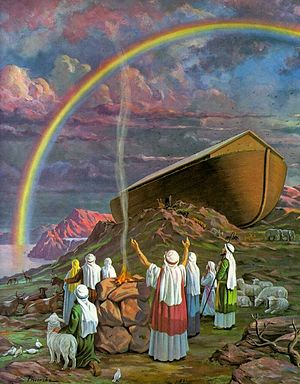
And what’s the first thing Noah does, leaving the ark?
And Noah builded an altar unto the Lord (Gen. 8:20).
He gives thanks unto God! For what? For the work of salvation performed over him and his household. Because the construction of an altar is always prayer. Again I repeat: A sacrifice unto God is a broken spirit, a heart that is broken and humbled God will not despise (Ps. 50:19). Noah arranges the altar: the first thing he does is to serve a moleben of thanksgiving unto God.
With us, unfortunately, it happens quite otherwise. When we have troubles, then we say: “O Lord, O Lord, help!” And when we find relief then we forget about God. How often we forget to thank God! Even at a meal before beginning to eat we say the Our Father, and afterwards, the “We thank Thee, O Christ our God” we forget. In the morning we read our morning prayer rule that throughout the day nothing bad would happen, and in the evening—we’d rather sleep. Noah does not behave thus. He thanks God:
and took of every clean beast, and of every clean fowl, and offered burnt offerings on the altar (Gen. 8:20).
Noah offers to God clean animals. Clean and pure animals for Old Testament sacrifices were the best and most effective preaching for the people living at that time. It heralded that the Son of God is coming without spot or blemish, unlike unto all, but without sin, and He will save mankind. We live in a different time, and we need different preaching.
God receives this sacrifice because it was pure, orderly, and thankful.
The final verse of chapter eight is very important. It is the promise of God, Who says:
While the earth remaineth, seedtime and harvest, and cold and heat, and summer and winter, and day and night shall not cease (Gen. 8:22).
We see how the climate changes: this is the first time Holy Scripture speaks about summer and winter.
So, the waters of the Flood cleansed the whole world from sin and sinners. It’s an answer to those who ask that if God exists, why doesn’t He put everything in order? God brought order from a position of strength, but people didn’t become better from it. Why? I’ll answer. The reason is that sin is rooted in the human soul, and therefore it’s necessary to bring order precisely into the soul. According to the fathers, the soul is tri-fold: mind, sense, and will. Order begins with the repentant attitude of the mind. Man must understand in which condition he finds himself, what’s happening to him, and what is the meaning of his life. If someone is unwilling to reflect upon these questions, then his life becomes delirious and no external changes (reformative, societal) will be able to change his life for the better, both for the individual and for society as a whole.
